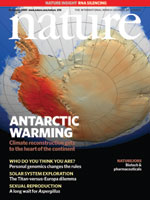Last week this blog looked at an ongoing dispute stemming from a cover article in nature which, it seems, was defective and misleading concerning the temperature in Antarctica. The issue was the statistical algorithm used to engineer a warming of Antarctica beyond what the data justified. The peer reviewed paper challenging the Nature article called into question the original Nature paper and itself encountered resistance and apparent obstruction which which called into question the peer-review system.
The peer review issues raised are remarkably similar to those which surfaced in the Climategate emails giving evidence on the same issue.
One of the things that saps confidence in establishment climate science is the demonstrated inability to admit errors, hence fostering a suspicion of improbity. This has been the case with the 'hockey stick' representation of proxy temperatures over almost 1000 years. It was certainly the case with the journal EOS as described here in January. (That case, however, was partly redeemed by the belated apology of Edinburgh climate scientist Tom Crowley). EOS, however has failed to remedy their manifest injustice.
Edinburgh climate scientist Gabi Hegerl features in another recent paper in Nature which is currently coming under sustained scrutiny. If some critiques turn out to be accurate this may well prove to be the next test of the probity of Nature and, indeeed, Hegerl.
The paper concerns weather extremes (actually rainfall in the northern hemisphere). There is a current meme in public thought which seeks to attribute human emissions as a cause of weather extremes. That is both unfortunate and, if many reputable scientists are to be believed, misleading in the extreme. As one character in the film Inception observed, "The most resilient parasite is an idea planted in the unconscious mind."
Perhaps Hegerl and her fellow authors have a bias to finding and interpreting that data to fit the meme. Certainly the paper is under considerable attack by some formidable scientists and some, perhaps not so formidable. Curry (here and here), Pielke Snr, Pielke Jnr, Eschenbach, Whitehouse and Motl,
Then there is the problem of falsifiability. What would it take to prove the meme wrong? Is it drought? Is it floods. Is it snow. Of course it is conceivable these could be mutually consistent with (man made) global warming. Unlikely that but conceivable. Yet it seems there are establishment apologists who attribute opposing evidence to man made climate change be that evidence snow, or rain, warmth or cold, more ice or less ice.
The vague term 'climate change' turns out to be unfalsifiable.
The peer review issues raised are remarkably similar to those which surfaced in the Climategate emails giving evidence on the same issue.
One of the things that saps confidence in establishment climate science is the demonstrated inability to admit errors, hence fostering a suspicion of improbity. This has been the case with the 'hockey stick' representation of proxy temperatures over almost 1000 years. It was certainly the case with the journal EOS as described here in January. (That case, however, was partly redeemed by the belated apology of Edinburgh climate scientist Tom Crowley). EOS, however has failed to remedy their manifest injustice.
Edinburgh climate scientist Gabi Hegerl features in another recent paper in Nature which is currently coming under sustained scrutiny. If some critiques turn out to be accurate this may well prove to be the next test of the probity of Nature and, indeeed, Hegerl.
The paper concerns weather extremes (actually rainfall in the northern hemisphere). There is a current meme in public thought which seeks to attribute human emissions as a cause of weather extremes. That is both unfortunate and, if many reputable scientists are to be believed, misleading in the extreme. As one character in the film Inception observed, "The most resilient parasite is an idea planted in the unconscious mind."
Perhaps Hegerl and her fellow authors have a bias to finding and interpreting that data to fit the meme. Certainly the paper is under considerable attack by some formidable scientists and some, perhaps not so formidable. Curry (here and here), Pielke Snr, Pielke Jnr, Eschenbach, Whitehouse and Motl,
Then there is the problem of falsifiability. What would it take to prove the meme wrong? Is it drought? Is it floods. Is it snow. Of course it is conceivable these could be mutually consistent with (man made) global warming. Unlikely that but conceivable. Yet it seems there are establishment apologists who attribute opposing evidence to man made climate change be that evidence snow, or rain, warmth or cold, more ice or less ice.
The vague term 'climate change' turns out to be unfalsifiable.





